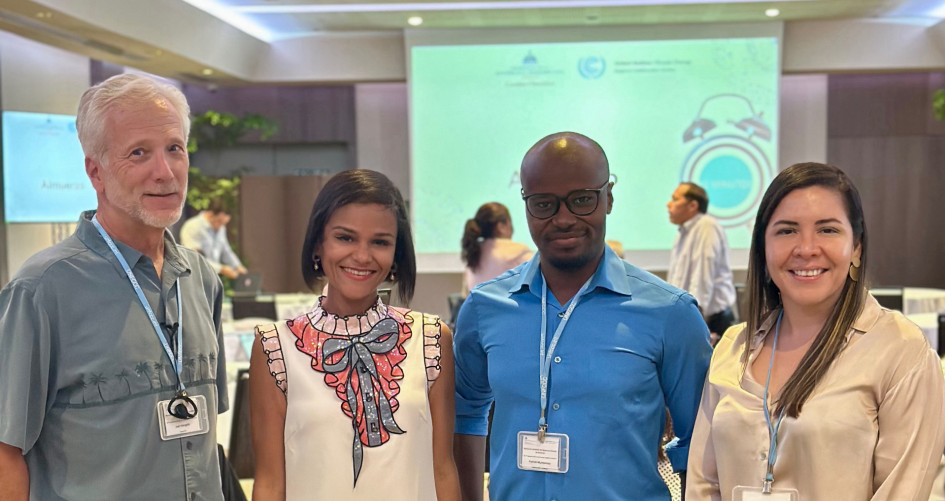First UNFCCC carbon emission trading simulation workshop held in the Caribbean
The Regional Collaboration Centre for the Caribbean (RCC Caribbean), in collaboration with the National Council for Climate Change (Consejo Nacional para el Cambio Climático – CNCC) and the Dominican Republic government, organized the first Emission Trading Simulation (ETS) on 26 and 27 September in Santo Domingo, Dominican Republic, providing participants with a hands-on experience.
Background
Since 2017, the CNCC and RCC Caribbean have been working collaboratively to support the Dominican Republic in establishing an ETS. This effort, supported by the Collaborative Instruments for Ambitious Climate Action (CiACA) project, has helped to position the Dominican Republic as a pioneer in the Caribbean region for implementing such an environmentally significant instrument.
Highlights
This two-day training convened 32 participants, including government representatives and representatives from larger emitting industries in the Dominican Republic. The heart of the event was a realistic carbon market simulation facilitated by the CarbonSim software. This artificial intelligence-enhanced, multilingual, and multi-user application allows users to understand emissions trading, help them manage fictitious carbon portfolios, trade carbon allowances and offsets, and implement on-site carbon emission abatement technologies.
Family picture - participants attending the training in Dominican Republic
Day One: Experts from Mexico2 and RCC LATAM provided an overview of carbon pricing as an instrument, leading to insightful discussions on the relevance and effectiveness of market instruments in achieving emission reductions.
Day Two: Participants played the role of carbon portfolio managers and traded emissions allowances to comply with ETS targets at the lowest cost possible. Working in pairs, each group managed a fictitious company carbon portfolio for six virtual years. At the end of the workshop, the best-performing groups shared the strategies they used with the rest of the team.
Implementing Dominican Republic’s climate plan
Dr Max Puig, CCNC Executive President addressed participants and highlighted Dominican Republic's efforts to establish a domestic carbon market. He emphasized the important role such efforts play in the implementation of the country’s climate plan or Nationally Determined Contribution (NDC). Through this, the Dominican Republic has committed to reducing its emissions by 27% by 2030 and aims to become carbon neutral by 2050. An ETS can be key in helping the Caribbean island achieve its goals while promoting green economic growth.
Global perspective
A growing number of countries across the globe are considering carbon pricing instruments as an approach for their climate action implementation plans under the Paris Agreement. Carbon pricing policies such as Emission Trading Systems are widely recognized as cost-effective instruments to help reduce greenhouse gases, especially in sectors of the economy that are challenging to decarbonize.
Collaboration and support
The workshop was supported by the CiACA project which seeks to support Parties in the development of carbon pricing approaches for implementing their NDCs under the Paris Agreement. Jointly managed by UN Climate Change and its network of Regional Collaboration Centres, this initiative is enabled through funding by the Federal Ministry for Economic Affairs and Climate Action of Germany.
This training convened 32 participants from the government and representatives of larger emitter industries in the country. A real-life carbon market was simulated thanks to the CarbonSim software, managing fictitious companies' carbon portfolios through trading carbon allowances and offsets and implementing on-site carbon emission abatement technologies. CarbonSim is an artificial intelligence-enhanced, multi-lingual, multi-user, software application that teaches the principles of emissions trading and brings markets to life.
On the first day, experts from Mexico2 and RCC LATAM provided participants with an overview of carbon pricing as an instrument, including discussions over the relevance and effectiveness of market instruments to achieve emission reductions.
On the second day, participants played the role of carbon portfolio managers and traded emissions allowances to comply with ETS targets at the lowest cost possible. Participants teamed up in groups of two, and each group managed a fictitious company carbon portfolio for six virtual years. At the end of the workshop, the best-performing groups shared different strategies used.
Participants using CarbonSim and discussin carbon pricing strategies
Dr Max Puig, CCNC Executive President addressed participants and highlighted Dominican Republic's efforts to establish a domestic carbon market and the importance of such efforts to implement the country’s climate plan, its Nationally Determined Contribution (NDC). Through its NDC, the Dominican Republic has committed to reducing its emissions by 27% by 2030 and aims to become carbon neutral by 2050. An ETS can play an important role in helping the Caribbean island achieve its goals while promoting green economic growth.
A growing number of countries across the globe are considering carbon pricing instruments as an approach to implement their climate plans under the Paris Agreement. Carbon pricing policies such as Emission Trading Systems are widely recognized as cost-effective instruments to help reduce greenhouse gases, especially in the most difficult-to-decarbonize sectors of the economy.
The workshop was supported by the project Collaborative Instruments for Ambitious Climate Action (CiACA): this project seeks to support Parties in the development of carbon pricing approaches for implementing their NDC under the Paris Agreement. The initiative is jointly managed by the UN Climate Change secretariat and its network of Regional Collaboration Centres and is enabled through funding by the Federal Ministry for Economic Affairs and Climate Action of Germany.

